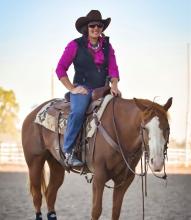Faculty




Staff

Students enrolled in this program show an interest in the organizational, managerial, and commercial aspects of the equine industry; as well as students interested in advanced performance horse care, equine reproduction, instruction and stable management.
The variety of courses focusing on business management provide students with the skills and knowledge to pursue in either a hands-on or support sector position in the equine industry, pursue a career in business or to pursue an advanced degree.
Program Learning Outcomes:
Choose one of the following courses.
| Course Number | Course Title | Credits | Details |
|---|---|---|---|
ENG115ENG1015 |
Technical English & Communication | 3 | |
|
Focuses on the written and oral communication needs of students in vocational and technical fields. Enables the student to practice written, oral, reading, reasoning, and interpersonal communication skills in order to become successful (or to remain successful) in the workplace. (3-0) |
|||
ENG121ENG1021 |
English Composition I: GT-CO1 | 3 | |
|
Emphasizes the planning, writing, and revising of compositions, including the development of critical and logical thinking skills. This course includes a wide variety of compositions that stress analytical, evaluative, and persuasive/argumentative writing. This is a statewide Guaranteed Transfer course in the GT-CO1 category. Prerequisite: College Readiness in English. (3-0) |
|||
ENG131ENG1031 |
Technical Writing I: GT-CO1 | 3 | |
|
Develops skills one can apply to a variety of technical documents. Focuses on principles for organizing, writing, and revising clear, readable documents for industry, business, and government. This is a Statewide Guaranteed Transfer course in the GT-CO1 category. Prerequisite: College Readiness in English. (3-0) |
|||
| Course Number | Course Title | Credits | Details |
|---|---|---|---|
COM115COM1150 |
Public Speaking | 3 | |
|
Combines the basic theory of speech communication with public speech performance skills. Emphasizes on speech delivery, preparation, organization, support, audience analysis, and delivery. (3-0) |
|||
Choose MAT1140 or higher Math Course.
| Course Number | Course Title | Credits | Details |
|---|---|---|---|
MAT107MAT1140 |
Career Math: Program Emphasis | 3 | |
|
Agriculture Emphasis - Covers material designed for career and technical students who need to study particular mathematical topics. Topics include measurement, algebra, geometry, statistics, and graphs. These are presented at an introductory level and the emphasis is on applications. Prerequisite: Successful completion of MAT0250 or MAT0300 with a "C" grade or better or appropriate placement scores. (3-0) Wind/Welding Emphasis - Covers material designed for career and technical students who need to study particular mathematical topics. Topics include measurement, algebra, geometry, and graphs. These are presented at an introductory level and the emphasis is on applications. Prerequisite: Successful completion of MAT0250 or MAT0300 with a "C" grade or better or appropriate placement scores. (3-0) |
|||
| Course Number | Course Title | Credits | Details |
|---|---|---|---|
ASC100ASC1100 |
Animal Sciences | 3 | |
|
Covers the basic fundamentals of livestock production including the principles of nutrition, reproduction, breeding, genetics, health, and physiology of cattle, sheep, swine, horses, and other farm species. Trends and issues in animal science and animal agriculture are also discussed in this course. (3-0) |
|||
Choose one of the following courses:
| Course Number | Course Title | Credits | Details |
|---|---|---|---|
AGB102AGB1002 |
Foundations of Agricultural business | 3 | |
|
Focuses on the foundational aspects of the primary agriculture business areas including economics, management, marketing, sales, and finance in an applied manner. Current events in agriculture are discussed with emphasis on application to agribusiness. (3-0) |
|||
AGE102AGE1102 |
Agriculture Economics: GT-SS1 | 3 | |
|
Focuses on economic principles and decision-making by consumers, firms, and government with emphasis on their application to the food, fiber, and natural resource sectors of the economy. This is a Statewide Guaranteed Transfer course in the GT-SS1 category. (3-0) |
|||
| Course Number | Course Title | Credits | Details |
|---|---|---|---|
AGB120AGB1020 |
Agricultural Salesmanship | 3 | |
|
Principles and techniques of agricultural sales as applied to goods and services being sold to individual producers or agricultural businesses. Emphasis will be placed on building business relationships and product training. (3-0) |
|||
AGB218AGB2018 |
Computerized Farm Records | 3 | |
|
Emphasizes the planning and development of record keeping systems, the interpreting and analyzing of agricultural business records, balance sheets, cash flows, and income statements with the aid of a computer. (3-0) |
|||
AGB228AGB2028 |
Agribusiness Management | 3 | |
|
Provides the student with basic management principles and practical experience in applying principles of economics, business, marketing, and finance to the management of an agri-business operation. (2-1.5) |
|||
AGE208AGE2108 |
Agricultural Finance | 3 | |
|
An introductory course in principles of finance and their application to agriculture and agri–business, including the time value of money, net present value analysis, interest, credit, lending institutions, financial statements, and financial ratios. Prerequisite: Successful completion of AGE1102 with a "C" grade or better. (3-0) |
|||
ASC102ASC1102 |
Introduction to Equine Science | 4 | |
|
This course covers the basics of the equine industry, breeds, selection, form to function, care and management, soundness, health, reproduction, feeding, facilities, physiology, production systems, and management systems. (3-2) |
|||
ASC225ASC2125 |
Feeds and Feeding | 4 | |
|
A study of the basic nutrients, common feeds, and feed additives fed to livestock, anatomy of digestive systems, and basic feeding practices for beef, sheep, swine, horses, and dairy. The lab portion of this class will be devoted to calculating and balancing rations to fulfill nutrient requirements for farm animals for growth, finishing, reproduction and lactation, and work. Prerequisite: Successful completion of ASC1100 with a "C" grade or better. (3-2) |
|||
CIS118CIS1018 |
Introduction to PC Applications | 3 | |
|
This course introduces basic computer terminology, file management, and PC system components. Provides an overview of office application software including word processing, spreadsheets, databases, and presentation graphics. Includes the use of a web browser to access the Internet. (3-0) |
|||
|
*Agriculture Emphasis preferred |
|||
EQM158EQM1058 |
Equine Reproduction | 2 | |
|
Introduces horse reproduction and the various breeding and management practices found on breeding farms. Covers physiology of the mare and stallion reproductive systems, care of the stallion and the mare, mare heat detection, breeding, care of pregnant mares, foaling, problems in the foal, and care of the foal and yearling. (2-0) |
|||
EQM210EQM2010 |
Equine Health | 2 | |
|
Assists students in planning annual equine health programs. Introduces students to methods of prevention, recognition, and treatment of common equine diseases. (2-0) |
|||
EQM211EQM2011 |
Equine Health Lab | 1 | |
|
Application of practical skills, methods, and techniques used to prevent and treat equine diseases and health problems. (0-1.5) |
|||
Minimum of 14 credits of elective courses are required. All elective courses must be approved by NJC Academic Advisor or Program Coordinator. Courses in the following disciplines (Prefixes) are preferred: ACC, AGB, AGE, AGP, AGR, AGY, AME, ASC, BUS, CIS, EQM, EQT, JOU, MAN, MAR, MGD, or RAM. Other related courses must be approved by NJC Academic Advisor or Program Coordinator.




